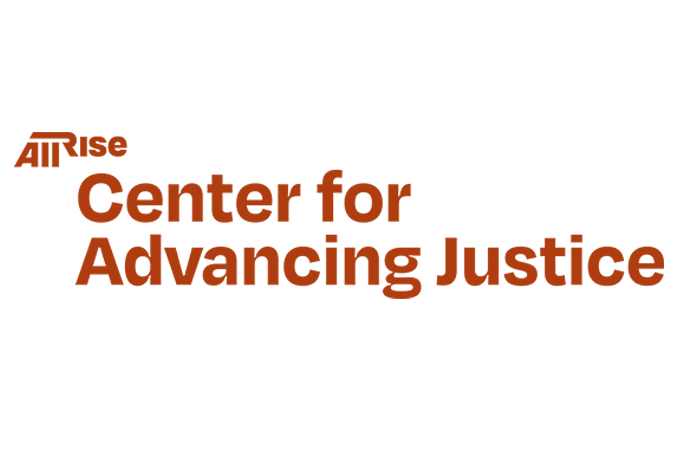Division Update: The Center for Advancing Justice

Expanding Evidence-Based Approaches at Every Intercept
The Center for Advancing Justice His the Road
All Rise’s newest division, the Center for Advancing Justice, is reshaping the justice system’s responses to substance use, mental health, and trauma. The Center was established in 2023 to drive innovations that address these issues at every intercept point in the justice system. While treatment courts remain the most successful justice intervention for high-risk, high-need individuals, the Center seeks to increase options for other justice-involved populations with substance use and mental health disorders.
Universal Screening, Assessment, and Referral
Kenosha County, Wisconsin, is a midsize community of 170,000 people on the banks of Lake Michigan, about an hour north of Chicago. Of the nearly 6,000 annual arrests in Kenosha County, an estimated 72% involve individuals with substance use issues. In Kenosha County, as in many jurisdictions, little infrastructure exists to screen and assess these individuals, and there are few programs to provide them with the appropriate level of treatment or other services.
In October 2024, judges, court staff, prosecutors, defense attorneys, law enforcement, and local service providers gathered for a community forum to discuss a new effort to enhance community safety. The meeting, which was convened by the Center for Advancing Justice, was part of a multiyear project funded by the U.S. Department of Justice. The project is designed to enhance Kenosha County’s capacity to identify and serve individuals in need of substance use and mental health treatment through rapid screening, assessment, and referral to appropriate services and supervision.
“For decades, treatment courts have been at the forefront of justice innovation to address crime related to substance use, mental health, and co-occurring disorders,” explained All Rise Chief Development Officer and project co-lead Aaron Arnold. “But not every individual is a good fit for treatment court. Justice systems must be equipped with knowledge and tools to address the full range of criminogenic risk and need among justice-involved people and match them with the appropriate level of accountability and treatment as soon as possible.”

In addition to the community forum, the Center’s visit to Kenosha County included training justice system officials on the use of risk/need screening tools, mapping the county’s case flow process, and hosting a strategic planning workshop. Over the next several months, the Center’s staff will help implement new policies and practices that improve the county’s approach to screening, assessment, referral to treatment and supervision.
“The Adult Treatment Court Best Practice Standards provide a blueprint for responding to individuals in the justice system impacted by substance use and mental health,” said Arnold. “Our work in Kenosha County is demonstrating how the standards can be applied more broadly to ensure that all courts—not just specialized treatment courts—have a range of evidence-based options in place to offer a whole-system solution to the unique clinical and criminogenic needs of justice-involved people.”
Educating the Judiciary on the Science of Substance Use Disorder and Evidence-Based Justice Responses
It’s been a busy year for the Center. This summer, with funding from the Office of National Drug Control Policy, Executive Office of the President, the Center released a dynamic new curriculum for the state court judges on the science of substance use disorder, the treatment continuum, and the recovery process. Judges from general criminal courts across the country learned evidence-based supervision practices with the goal of increasing the use of best practices in court.
“Judges play a pivotal role in ensuring that individuals with substance use disorders receive effective treatment while in the justice system so they can avoid future justice system contact,” said project director Wendy Schiller. “This curriculum helps judges—regardless of the type of court they preside over—make more informed decisions, improving outcomes for individuals and their communities.”
Approximately 75% of participants indicated that they felt very or extremely knowledgeable on the topic after receiving the training, and 88% felt strongly that the information was relevant to their work.
This online curriculum and in-person training opportunities for 2025 will be announced soon.
Reducing Childhood Trauma
According to a 2016 National Survey of Children’s Health, over half of the children in the U.S. have experienced at least one adverse childhood experience, and one in five have experienced at least two traumatic events. For children with one or more justice-involved parents or caregivers, exposure to trauma is significantly increased.
The Center has continued All Rise’s partnership with Sesame Street in Communities to equip courts with free educational tools, family-centered resources, and child-friendly play spaces to better serve justice-involved families.
Working with an expanding list of pilot sites, the Center trains courts to implement materials from Sesame Street in Communities in order to strengthen communication and connectedness between parents, caregivers, and their children, with the aim of reducing trauma and increasing recovery capital.
A 2024 outcome evaluation from the pilot site in Cook County, Illinois, found that following training, 97% of treatment court team members felt that discussing Sesame Street concepts and resources benefited court participants. Over half of the participants surveyed indicated that the resources helped them communicate better with their children.
Looking Ahead
The Center will continue its important work this year and add several exciting new projects. “I am thrilled at the positive response the Center for Advancing Justice has received so far,” said Arnold. “As we travel the country, we are seeing an openness to new ideas and cutting-edge approaches to make communities safer through more effective responses to individuals impacted by substance use and mental health conditions.”
Stay tuned as the newest All Rise division continues to drive effective justice innovation!